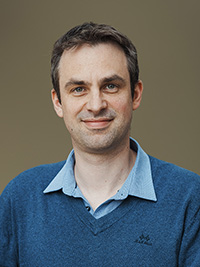NCMM warmly congratulates group leaders Marieke Kuijjer, Biswajyoti Sahu and Anthony Mathelier on receiving funding from the Norwegian Cancer Society. The Norwegian Cancer Society annually allocates funds to support cancer research in Norway. This year, all applications sent from NCMM group leaders were funded!
The projects at NCMM are supported through different thematic categories by the Norwegian Cancer Society. Mathelier’s project is supported through 'Rosa sløyfe', while Sahu receives funding through the open call for cancer research. Marieke Kuijjer's project is supported by 'Krafttak mot kreft'.
Common for the projects of Sahu, Kuijjer and Mathelier, is that they will take on a basic science approach to advance our understanding of cancer development and potential targets for future treatments.
Dissecting epigenetic plasticity driving pancreatic cancer for precision genomics

Cancer is a genetic disease characterized by tissue-specific mutations in well-known cancer driver genes. These mutations alone, however, are not sufficient to make normal cells into cancer cells.
One of the non-genetic factors that is known to increase cancer risk is inflammation. The goal of Biswajyoti Sahu’s project is to elucidate on a molecular level, how inflammatory signals collaborate with cellular regulatory pathways and oncogenic mutations to promote development of pancreatic cancer.
Pancreatic cancer is one of the most lethal cancer types with very poor prognosis. A better understanding of the signalling pathways that are active in pancreatic cancer cells will help to develop more accurate diagnostic tests and more effective targeted treatments in the future.
The Norwegian Cancer Society supports the project with 8 mNOK.
Precision Network Medicine for treatment stratification of metastatic breast cancer

Metastatic breast cancer is a complex disease. Each individual metastatic tumor has a unique set of gene mutations and a distinctive pattern of how these genes function in the cancer cell. It has recently become clear that disruptions in interactions between genes are also unique and can drive tumor development.
Marieke Kuijjer's project aims to develop advanced computational tools that can model the network of interactions for individual cancer cells. The aim is to use these tools to identify specific tumor cells with disturbances in their network interactions, and where this leads to the development of breast cancer metastases.
This can help to understand why some patients have more aggressive metastatic disease than others and why so many metastases do not respond to cancer treatment. Through this project, the Kuijjer group aims to identify potential new treatment options that specifically target individual subsets of breast cancer metastases.
The Norwegian Cancer Society supports the project with 8 mNOK.
Characterization of transcription factors that drive deregulation of the gene regulatory program through aberrant DNA methylation patterns in cancer cells

Aberrant DNA methylation, a type of molecular switch, is a common feature of many cancers and is often an early event in tumor development. It is hypothesized that this DNA methylation is controlled by specific transcription factors (TFs), which modulate gene expression rates by binding to specific TF binding sites (TFBS).
Despite ongoing research efforts, current understanding of the master regulators that drive this process in a cancer-specific manner, and its downstream effect on gene regulation that promotes tumor growth, remains limited.
To tackle this challenge, Anthony Mathelier’s project aims to create an innovative computational model combined with functional validation. The goal is to elucidate the reconfiguration of the gene regulatory network driven by abnormal DNA methylation patterns, potentially highlighting new biomarkers and therapeutic targets.
The Norwegian Cancer Society supports the project with 7,5 mNOK through funding from Rosa Sløyfe.
